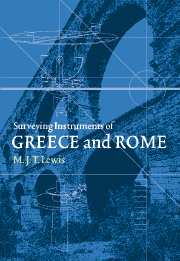12 - Epilogue
Published online by Cambridge University Press: 04 November 2009
Summary
The foundations of instrumental surveying were laid down by Greece and Rome. With the fall of the western empire in the fifth century AD the science of engineering surveying, like so much else, seems to have been lost; certainly little was built in western Europe over the next five centuries or more which required anything like the same techniques. But what happened in the East? How much survived in the Byzantine empire and in Islam, and was that knowledge transmitted back to medieval Europe? And did the contemporary or later practices of China display any features which might suggest some interaction with the West?
To tackle this last question first, China, which in terms of technology paralleled Greece and Rome in so many ways and at the same kind of period, had just as much need of surveying. Its system of major and minor canals made up for the almost complete absence of urban aqueducts, cartography flourished, and agrimensorial and military needs were comparable. Needham, however, the great authority, can give little detail of instruments or techniques. Not surprisingly, the most basic tools – gnomon, plumb-line, cord, chain and graduated rod or staff – were much as in the West. His arguments for the existence in China by the second century BC of the sighting tube and by the second century AD of the groma are not very convincing, nor does he explain how they might have been used.
- Type
- Chapter
- Information
- Surveying Instruments of Greece and Rome , pp. 246 - 256Publisher: Cambridge University PressPrint publication year: 2001

